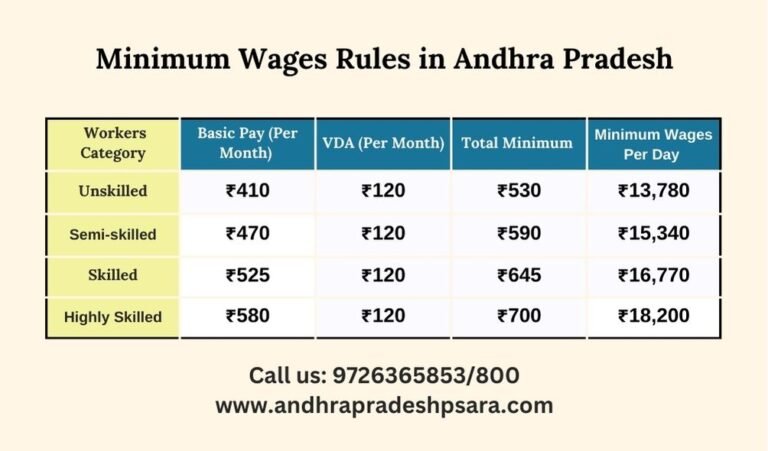Minimum Wages Rules in Andhra Pradesh
Are you looking for an easy way to understand the Minimum Wages Rules in Andhra Pradesh? These rules are meant to make sure that workers are paid fairly for the work they do. Simply put, the government has fixed the minimum amount that must be paid to workers in different jobs—especially in places like factories, farms, shops, and small businesses. The rules also explain how long someone can work in a day, when they should be paid extra for overtime, and when they should get breaks for rest or meals. These rules help workers know their rights and make sure employers treat them fairly. It’s a way to make sure no one is underpaid or overworked.
Wages Rules Explained: Expert Insights for You
Wages Guidelines for Andhra Pradesh
The wage guidelines in Andhra Pradesh are designed to protect workers and ensure fair treatment in all types of employment. Every worker must be paid at least the minimum wage fixed by the government based on their skill level—unskilled, semi-skilled, or skilled. Employers must pay wages on or before the 7th of each month. A standard working day should not exceed 8 hours, and workers are entitled to proper rest breaks and at least one weekly off. If a worker does overtime, they must be paid at twice their regular wage rate. Wage details should be clearly displayed at the workplace, and all payment and attendance records must be properly maintained.
The law also ensures that no illegal deductions are made from wages, and equal pay is given for equal work, regardless of gender. The Andhra Pradesh government regularly updates the minimum wage rates, and both workers and employers should stay informed about the latest changes. Labour officers may visit workplaces to ensure that these rules are being followed. These guidelines are essential for creating a fair, safe, and lawful work environment across the state.
Minimum Wages by Category in Andhra Pradesh
- In Andhra Pradesh, the government sets different wages based on the type of work and skill level.
- Workers are divided into 4 main groups:
➤ Unskilled – basic work like helpers, sweepers, loaders.
➤ Semi-skilled – work needing some experience like drivers, machine helpers.
➤ Skilled – trained workers like electricians, fitters, tailors.
➤ Highly skilled – expert-level workers like supervisors, technicians, engineers. - Each group has a minimum salary that employers must pay.
- Wages may also vary depending on whether the job is in a city or village, and the kind of industry or company.
- The government updates wage rates regularly to keep up with inflation and rising living costs.
- Employers must not pay less than the fixed rate based on the worker’s category.
- If an employer pays less, it is against the law and can lead to penalties or action.
- Workers can complain to the labour department if they are not getting the proper wages.
Andhra Pradesh Minimum Wages: New Slab Rates
The Government of Minimum Wages Rules in Andhra Pradesh has updated the minimum wages for 2025 to ensure workers receive fair pay that matches the rising cost of living. These rates apply across different job sectors and are categorized by the skill level of the worker. Wages are made up of two main parts:
👉 Basic Pay – the fixed daily wage
👉 VDA (Variable Dearness Allowance) – added amount to adjust for inflation (varies over time)
Here’s a quick look at the latest wage rates in Andhra Pradesh for 2025:
Worker Category | Basic Pay (₹/day) | VDA (₹/day) | Total Per Day (₹) | Monthly Total (₹) |
Unskilled | ₹410 | ₹120 | ₹530 | ₹13,780 |
Semi-Skilled | ₹470 | ₹120 | ₹590 | ₹15,340 |
Skilled | ₹525 | ₹120 | ₹645 | ₹16,770 |
Highly Skilled | ₹580 | ₹120 | ₹700 | ₹18,200 |
These rates are applicable across various sectors like construction, factories, shops, agriculture, and more. All employers must strictly follow these wage standards under the Minimum Wages Act, 1948, and display wage details clearly at the workplace. Any employer paying less than the fixed amount may face penalties. Workers should be aware of their rights and can report non-payment or underpayment to the local labour department.
Labour Law & Fair Pay in Andhra Pradesh
The Labour Department in Minimum Wages Rules in Andhra Pradesh is like a support system for workers. Its main job is to make sure that all workers get fair pay and are treated properly at their workplace. Whether you clean floors, work in a shop, or manage a team, the department is here to help.
What Does the Labour Department Do?
- Fixes Minimum Salary:
It sets the lowest amount a worker should be paid, depending on the type of work – from simple jobs to skilled work. - Visits Workplaces:
Officers go to shops, factories, and offices to check if workers are being paid correctly and if the rules are being followed. - Helps Workers with Complaints:
If a worker isn’t getting paid properly or is being treated unfairly, they can complain to the department. They will look into it and take action. - Checks Salary Records:
Employers must keep records of what they pay their workers. The Labour Department checks these to make sure no one is underpaid. - Takes Action When Rules Are Broken:
If a company breaks the law or doesn’t pay workers properly, the department can fine them or take legal steps. - Spreads Awareness:
The department also teaches both workers and employers about labour rules and wage rights through posters, camps, and websites.
Andhra Pradesh Legal Updates: What Changed Recently?
Andhra Pradesh is bringing in some helpful changes to make work and business life better for everyone. Whether you’re working a job or planning to start something of your own, here’s what’s new — explained in simple words:
- Wages Have Increased
If you’re working in AP, your pay might have gone up! The government has increased the minimum wages, so whether you do simple tasks or skilled work, you should now get better pay. - Government Work is Going Digital
No more long lines at government offices. Now you can apply for licenses, send reports, and get approvals right from your phone or computer. It’s faster and saves time. - Opening a Business is Now Easier
Starting a small business? It’s simpler now. You can register your business and finish your paperwork quickly through a single-window system. - Workplaces Are Being Checked More
Labour officers are visiting workplaces more often to make sure workers are getting paid on time and treated fairly. If they see any problem, they take action. - Records Are Now Digital
Employers are now keeping details like salary and attendance in digital format. It makes everything clear and easier during checks.
6. Everyone is Being Informed
The government is spreading useful info through messages, posters, and local events—so both workers and bosses know the rules and do things the right way.
How to Claim Unpaid Wages in Andhra Pradesh
If you haven’t received your salary or wages on time in Minimum Wages Rules in Andhra Pradesh, you have the legal right to raise a complaint. As a worker, your payment is protected under laws like the Payment of Wages Act and the Minimum Wages Act. First, try to talk to your employer directly and request your pending wages politely in writing. If that doesn’t work, you can approach the Labour Department in your district. You can visit the nearest labour office and file a formal complaint. It’s helpful to carry documents like your job appointment letter, salary slips, or attendance records as proof.
Once your complaint is received, the Labour Officer will review your case and speak to the employer. If they find that wages are indeed unpaid, they may instruct the employer to pay the dues and could also take legal action if needed. You don’t need a lawyer to file the complaint—just follow the steps and submit the right documents. The system is in place to make sure every worker in Andhra Pradesh gets the pay they deserve for their hard work.
Ensuring Fair Pay and Following the Law in Andhra Pradesh
In Andhra Pradesh, making sure workers get fair pay is not just a good idea—it’s the law. The government has set clear rules to make sure everyone who works gets paid on time and properly. These rules are written in laws like the Minimum Wages Act and Payment of Wages Act. Based on the type of work—whether it’s simple, skilled, or highly skilled—the government decides the least amount a worker should be paid. This is called the minimum wage, and it gets updated from time to time to keep up with rising prices.
The Labour Department checks if companies are following these rules. They visit workplaces, check payment records, and also help workers who are not being paid properly. If an employer breaks the rules, they can face penalties. These laws help protect workers and also help businesses stay safe and legal. When everyone follows the rules, work becomes fair and better for all.

